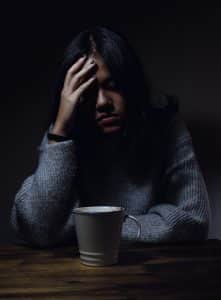What is Depression?
Major depressive disorder, commonly known as depression, is a mood disorder that affects emotions, cognition, and behaviour. Depression affects how we feel, think, and behave, and as a result it can have a major impact on our day to day lives.

What are some of the symptoms of depression?
There are two main noticeable symptoms that tend to be present when someone is clinically depressed.
Firstly, someone who is clinically depressed will experience a pervasive sadness continuously for at least two weeks. This sadness is less reactive to changes to the surrounding environment compared to the sadness that is felt as part and parcel of life.
Secondly, someone who is depressed will experience a loss of interest or pleasure in most daily activities.
Some of the other symptoms of depression are:
- Feeling demotivated and hopeless
- Often wanting to stay at home, rather than going out to socialize or doing new things
- Sleep disturbances, both insomnia/sleeping too little and sleeping too much
- Tiredness and a general lack of energy, where even small tasks can take a lot of effort
- Reduced appetite and weight loss or increased cravings for food and weight gain
- Having trouble concentrating, making decisions, and remembering things
- Slowed body movements, speaking, and thinking
- Feelings of worthlessness, guilt, and self-blame
- Agitation, irritability, and angry outbursts
- Recurrent thoughts of death, suicidal thoughts, and suicide attempts
What should I do if I think I have depression?
If you think you have depression, it’s best to immediately seek help from a trained psychiatrist so you can be properly diagnosed and treated.
It’s important to understand that depression is a medical disorder, and there are treatments available. The earlier depression is diagnosed and treated, the better the prognosis, and untreated depression can lead to further health complications.
How do I know if I or someone I love is depressed?
You can apply the 5:2:1 rule.
If someone is experiencing 5 of the symptoms listed above, has been experiencing these symptoms for 2 weeks, and 1 of the symptoms is either a pervasive sadness or loss of interest, they may be depressed and should seek a consultation with a professional.
What does the depression treatment pathway involve?
Treatment for major depressive disorder takes a holistic bio-psycho-social-spiritual approach.
1) Bio
Pharmacological treatment. In depression, this involves anti-depressants.
There are many types of anti-depressants available, and psychiatrists tailor the prescriptions according to the symptoms that the patient has.
2) Psycho(logical)
Major depressive disorder is associated with many unhelpful cognitive or core beliefs. These include believing one is not good enough, that one is a failure, that one is defective.
Tackling this is where psychological intervention comes into play.
Common psychological interventions we use include Cognitive Behavioural Therapy (CBT) and Schema Therapy. If the patient has depression because of severe emotional trauma, we can also consider EMDR.
Counselling also plays a part, especially in helping the patient develop good stress management, coping skills and problem-solving skills.
3) Social
The social environment that the patient is in is very important for recovery. If people around them have high expressed emotions, this can hinder the recovery of the patient.
Some examples of high expressed emotions are:
1) They’re very critical towards the patient,
2) They blame patients for feeling sad for extended periods,
3) They may not even acknowledge that this is a depressive disorder.
When treating depressive disorder, it’s then also important to look into the social environment and mobilize social support if the patient needs it.
4) Spiritual
When appropriate, we also incorporate spirituality into the recovery plan.
Spirituality here doesn’t mean religion. It can include religion, but it’s a wider scope than just that.
Spirituality can range from mindfulness meditation to seeking specific spiritual guidance to process and gain meaning of the challenges in our lives.
How do I make an appointment to see a psychiatrist?
Download the SuperMD app where we have fully trained and qualified psychiatrists ready to help at the convenience and privacy of your own home.
Book an appointment now and get the help you need.
